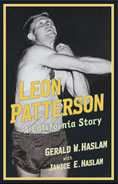
 |
In 1951, Leon Patterson (1933-1954) was a small, incredibly well-muscled teen cut-up of eighteen years, courting his wife-to-be, Dixie, and working summers in the oilfields in the Bakersfield region of California. His family members were farmers who had been forced by the Great Depression to migrate from Arkansas to Kern County, working in agriculture as they made the trek, “part of a multi-staged migration west... that had been made both famous and infamous by John Steinbeck’s novel Grapes of Wrath.” The Pattersons’ hometown of Taft, near Bakersfield, was part of a colony where many exhausted migrants from Arkansas, Oklahoma, and Texas banded together and battled the anti-migrant prejudice of California’s residents. Leon knew nothing but hard work from the time he was a toddler and had a zest for life (and mischief) that made athletic competition come naturally. In 1952, he would break a national high school record for the shot put, despite being “a runt.” Sadly, possibly as a result of an undiagnosed and untreated infection in his early childhood, Patterson died young, of Bright’s Disease.
Gerald W. Haslam, award-winning author noted for his books about California and the Bakersfield area in particular (Workin’ Man Blues, The Language of the Oilfields, Snapshots: Glimpses of the Other California, etc) has co-authored with Janice E. Haslam to present Patterson’s story effectively and emotively, against a dramatic backdrop of the region and the times. They have drawn on an acquaintance with Leon’s widow Dixie and access to her unpublished memoir, along with recollections from Leon’s high school pals and Gerald’s own memories as a contemporary of Patterson and a high school journalist in Kern County. This small book is as big as Patterson’s mettle—yet even bigger, encompassing the hopes and aspirations of a generation born in poverty, who were resolute in ambition and destined for better days. This is a worthy addition to the lore of the Great Depression, the great American migration, and the great names that sprang out of those troubled times.
RECOMMENDED by the US Review